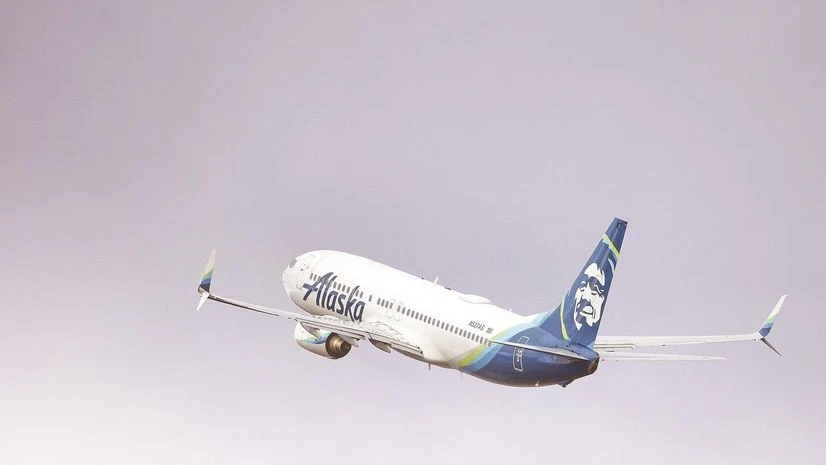An emergency landing by an Alaska Airlines jetliner has prompted US federal authorities to ground some Boeing 737 Max 9 aircraft, adding another episode to the troubled history of Boeing's Max lineup of jets.
Here is what to know about the Max 9 plane involved, and what comes next.
What happened?
An Alaska Airlines jetliner blew out a portion of its fuselage seven minutes after takeoff 3 miles (4.8 kilometres) above Oregon Friday night, forcing the pilots to make an emergency landing. None of the 171 passengers or six crew were seriously injured but the rapid loss of cabin pressure caused oxygen masks to drop from the ceiling. National Transportation Safety Board Chair Jennifer Homendy said the two seats next to the part that tore off were unoccupied.
How are federal authorities responding?
The Federal Aviation Administration ordered the grounding of some Boeing Max 9 operated by US airlines or flown into the country by foreign carriers until they are inspected. The emergency order affects about 171 planes worldwide.
The NTSB has begun an investigation that is likely to last months and focus on the panelled-over exit door that blew off. The so-called door plug is installed on some jets with fewer seats instead of an emergency exit panel. The jets ordered grounded by the FAA all have those panels installed.
Authorities are still searching for the door plug, which likely landed near Oregon Route 217 and Barnes Road in the Cedar Hills area west of Portland.
How are airlines responding?
Alaska Airlines has grounded its entire fleet of 65 Max 9s for inspections and maintenance. The airline initially kept 18 of its Max 9s in service Saturday because they had received in-depth inspections as part of recent maintenance checks. But the airline pulled those jets from service Saturday night to comply with an FAA directive for all operators of Max9s to conduct specific inspections.
More From This Section
United Airlines, the world's biggest operator of Max 9s, has grounded its entire fleet of 79 Max 9s.
Alaska and United are the only two US passenger airlines that operate Max 9 aircraft. The companies operate nearly two-thirds of the 215 Max 9 aircraft in service around the world, according to aviation analytics firm Cirium. Six other airlines use the Max 9: Panama's Copa Airlines, Aeromexico, Turkish airlines, Icelandair, flydubai, and SCAT Airlines in Kazakhstan, according to Cirium.
Copa said it had temporarily suspended 21 Boeing 737 Max 9s to comply with the FAA's order.
Alaska Airlines had canceled 163 flights on Sunday, or 21 per cent of its schedule, according to Flightaware. United Airlines had canceled 247, about 9 per cent of its scheduled flights. Not all of the cancellations were necessarily due to the Max 9 crisis.
Alaska Airlines said the groundings had resulted in at least 160 flight cancellations by Saturday evening and disruptions will last through at least mid-week. United had said Saturday evening said the inspections will result in about 60 cancelations.
Alaska Airlines has said affected passengers should go online to view rebooking options and can request a refund. The airline has said passengers whose flights are canceled will be moved the next available flight but they can also request a change or a refund without incurring fees under a flexible travel policy. United Airlines has not instituted a policy specific to the Max 9 inspections but the airline waives change fees for significant delays.
How safe it is to fly on one of these planes?
Federal officials and airline executives regularly tout the safety of air travel. There has not been a fatal crash of a US airliner since 2009, when a Colgan Air plane operated for Continental crashed near Buffalo, New York, killing all 49 people on board and one on the ground.
After arriving in Portland to investigate the Alaska Airlines incident, the NTSB's Homendy said the US has the safest aviation system in the world. However, a surge in close calls between planes at US airports in the past year prompted the FAA to convene a safety summit last year, in which officials encouraged airlines and pilots to redouble their attention to careful flying.
The incident has also renewed questions about the safety of Boeing's Max aircraft, which the newest version of the company's storied 737. There are two versions of the aircraft in service: the Max 8 and the Max 9, which is the larger of the two.
Regulators around the world grounded Max 8 planes for nearly two years after a Lion Air flight crashed in Indonesia in 2018, and an Ethiopian Airlines Max 8 crashed in 2019. Boeing changed an automated flight control system implicated in the crashes.
Last year, the FAA told pilots to limit use of an anti-ice system on the Max in dry conditions because of concern that inlets around the engines could overheat and break away, possibly striking the plane. And in December, Boeing told airlines to inspect the planes for a possible loose bolt in the rudder-control system.
However, those past issues are unrelated to Friday's blowout, which is exceedingly rare in air travel, according to Anthony Brickhouse, a professor of aerospace safety at Embry-Riddle Aeronautical University. Brickhouse said fuselage panels sometimes tears off planes but he could not recall a previous incident that blew a gaping hole like the one that forced Friday's emergency landing.
What is Boeing's response?
The company, based in Arlington, Virginia, issued a brief statement saying we deeply regret the impact this event has had on our customers and their passengers. Boeing said it supported the FAA's decision to require immediate inspections and said it was providing technical help to the investigators. The company has declined to make an executive available for interviews.
(Only the headline and picture of this report may have been reworked by the Business Standard staff; the rest of the content is auto-generated from a syndicated feed.)

)
